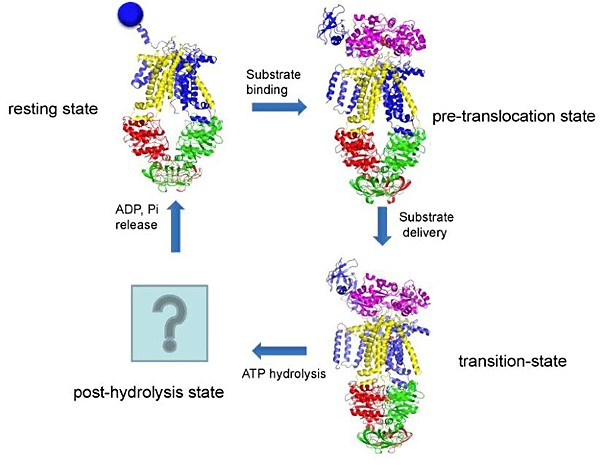Mempro™ Cell-Based ABC Transporters Production
Creative Biostructure has established an excellent platform after years of membrane protein production experience. Our custom Mempro™ ATP-binding cassette (ABC) transporters production service is based on our advanced cell-based expression systems.
Our most applied and advanced method for membrane proteins production is Mempro™ cell-based protein production system. ABC transporters belong to a transporter superfamily which is assumed to be the largest and oldest families in all extant phyla from prokaryotes to humans. All members of ABC transporters have a similar structural organization consisting of four domains-two transmembrane domains and two cytoplasmic domains. ABC transporters normally have multiple subunits, consisting of one or two transmembrane proteins and one or two membrane-associated ATPases. ABC transporters use the ATP binding energy and hydrolysis in order to transport a lot of substrates through cellular membranes. Most of ABC transporter substrates are hydrophilic including ions, amino acids, peptides, sugars, and other molecules. Patients who are on medication develop resistance both to the drugs they are taking and to some drugs eventually in multidrug resistance. ABC transporters are well known to have an important role in drug resistance development. Therefore, ABC transporters should inhibit themselves and using different types of drugs would help to solve the multidrug resistance problems.
 Figure 1. The maltose transport cycle by ABC transporter.
Figure 1. The maltose transport cycle by ABC transporter.
Creative Biostructure could provide you the best membrane protein production services, and we can apply various Mempro™ cell-based protein production systems including:
• Mempro™ ABC transporters Production in Insect Cells System
The baculoviruses are widely used for eukaryotic membrane protein production in cultured insect cells and insect larvae. According to similar codon usage rules, Mempro™ protein production using insect cells system can increase the expression level and reduce the truncated proteins compared to E. coli system.
• Mempro™ ABC transporters Production in Bacterial Cells System
Escherichia coli (E. coli) is the most widely applied bacterial host for membrane protein production. Lemo21 (DE3) strain is optimized for our Mempro™ protein production in our bacterial cells system.
• Mempro™ ABC transporters Production in Yeast Cells System
Single-celled yeast is an easy, quick and economic culture host and able to apply multiple post-translational modifications for eukaryotic membrane protein. Creative Biostructure has developed several strategies to improve yields per cell through optimizing the expression plasmid, host cell and culture conditions.
• Mempro™ ABC transporters Production in Mammalian Cells System
Creative Biostructure can provide another great service-Mempro™ protein production in mammalian cells system. This system helps to correct folding and post-translational modifications for membrane protein. We have proprietary Mempro™ protein production in mammalian cells system with high quality eukaryotic membrane proteins from numerous mammalian cell types including human embryonic kidney cells (HEK-293), Chinese hamster ovary cells (CHO), monkey kidney fibroblast cells (COS-7) and baby hamster kidney cells (BHK-21).
Creative Biostructure provides Mempro™ cell-based protein production services from expressing, isolating, purifying to crystallizing the membrane protein ABC transporters, accelerating its structural and functional studies.
We provide an array of Mempro™ membrane protein production services. Please feel free to contact us for a detailed quote.
References:
C. B. Shukalet, et al. (2016). Arsenic Triglutathione [As(GS)3] Transport by Multidrug Resistance Protein 1 (MRP1/ABCC1) Is Selectively Modified by Phosphorylation of Tyr920/Ser921 and Glycosylation of Asn19/Asn23. Mol. Pharmacol., 90(2): 127-139.
R. Prasad, et al. (2016). Yeast ABC transporters in lipid trafficking. Fungal Genet. Biol., 93: 25-34.
D. C. Rees, et al. (2000). ABC transporters: the power to change. Nature Reviews Molecular Cell Biology, 10: 218-227.